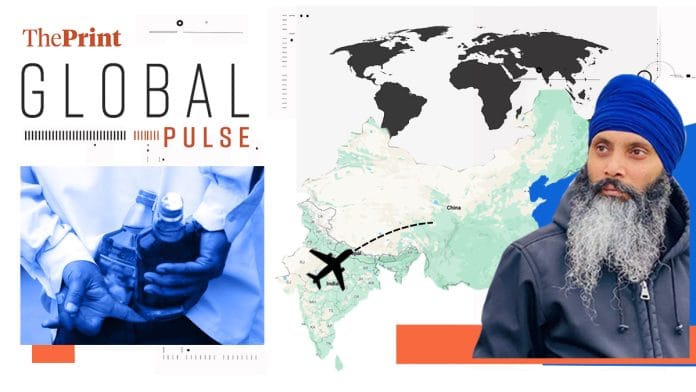New Delhi: A Global Times Editorial argues against India’s continual pause of direct flights with China. “As the two most populous countries in the world as well as neighbors, not having direct flights is obviously extremely abnormal,” the piece reads.
It blames India’s mindset of “demanding” and “coercion” in its relations with China, and says that New Delhi is “using bilateral reciprocal actions and even its own commitments as leverage to gain advantageous positions in border issues or bilateral relations.”
The piece titled ‘New Delhi should do correct math on direct flights between China, India’, however, claims that despite the strained relations, bilateral trade has continued to grow, with significant economic interdependence. India’s restrictions on Chinese investments and visas are seen as counterproductive, potentially harming its economic interests while failing to decrease reliance on Chinese goods.
The Globe and Mail’s in-depth report on ‘The Nijjar enigma’ is a comprehensive yet confusing account of the story of Hardeep Singh Nijjar, who was termed a Sikh separatist by India, and a “Canadian who was killed” by Canada. Nijjar’s death “has ignited a long-dormant rift between Canada and the world’s most populous country,” the piece by Nancy Macdonald and Greg Mercer reads.
In this piece, Macdonald and Mercer talk to those who were a part of Nijjar’s circle. Some of them are proven supporters of Khalistan, and came to Canada to avoid persecution. It raises questions from both sides as the authors write about the connections of Nijjar with bombings in India and with “training camps” in Canada.
The authors write, “So was Canada harbouring a terrorist, as India has claimed? Or, has India’s government inflated the threat posed by Mr. Nijjar, in an effort to boost political support?”
The piece calls it a “mystery” as statements from Nijjar’s “circle” and his acquittal contradict each other.
Sudhi Ranjan Sen and Arun Devnath write in Bloomberg’s report titled ‘Bangladesh, India Discuss River Project As China Looms’, about Bangladeshi Prime Minister Sheikh Hasina’s visit to India over the weekend. “Second in a fortnight”, the Bangladeshi PM’s visit was to discuss with PM Modi “how the two countries should share the waters of the 414 km-long (257 miles) Teesta river,” the report reads.
India and Bangladesh share 54 rivers, including the Teesta, whose water distribution has been under negotiation since the 1980s. An agreement reached in 2011 was halted due to objections from West Bengal.
Meanwhile, China has proposed a $1 billion project to help Bangladesh manage Teesta’s waters, which Bangladesh is now considering, the report notes. India, too, has offered to fund the project.
An obituary in the Economist talks about Birubala Rabha, an activist in Assam who campaigned against “witch-hunting” in Assam.
“A peasant herself, a tribal woman, simple and uneducated beyond class five; a farmer’s daughter, married at 15, who had grown crops and reared poultry to bring in little bits of money, as most did in this remote north-eastern corner” rose up through her work to get a nomination for the Nobel Peace Prize in 2005. She “purposely set out to rescue women; by her reckoning she saved around 90 lives, 35 of them personally,” the piece says.
Titled ‘Birubala Rabha fought to end the stigmatisation of women’, the obituary talks about Rabha’s own experience of being called a “witch” after the death of her husband. “For three years she was totally ostracised; she took it in her stride.”
The New York Times’ Mujib Mashal and Hari Kumar report on the 53 deaths in Tamil Nadu due to “tainted liquor”. The death toll may continue to rise. According to the NYT report, “98 people had been hospitalized”, and the “dead and hospitalized people are mostly daily wage laborers”.
Kumar and Mashal note the cause of this case being “bootleg alcohol with a high content of methanol.” Local officials were complicit, the report says, adding that arrests and transfers have already been made.
Also Read: Canada sees opportunity to engage with India on ‘keeping Canadians safe’ & India’s AI ambitions
Attack in Russia, and Iran’s impending elections
In a series of coordinated attacks on the Russian cities of Derbent and Makhachkala on 23 June, gunmen killed 15 people. Read the BBC’s report to know more about these attacks today on synagogues and orthodox churches.
As Iran prepares to go to polls this week to choose a new president, the campaign of six candidates call for reforms in economic, foreign policy, and treatment of women. To know more about the mood in the country, read NYT’s report.
(Edited by Radifah Kabir)
Also Read: Investors relieved as Modi 3.0 takes charge & it’s bread over bigotry for voters, say global reports






